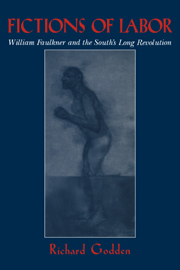Book contents
- Frontmatter
- Contents
- Acknowledgments
- Introduction
- 1 Quentin Compson: Tyrrhenian Vase or Crucible of Race?
- 2 Absalom, Absalom!, Haiti, and Labor History: Reading Unreadable Revolutions
- 3 Absalom, Absalom! and Rosa Coldfield: Or, “What Is in the Dark House?”
- 4 The Persistence of Thomas Sutpen: Absalom, Absalom!, Time, and Labor Discipline
- 5 Forget Jerusalem, Go to Hollywood – “To Die. Yes. To Die?” (A Coda to Absalom, Absalom!)
- Afterword
- Notes
- Bibliography of Works Cited
- Index
- Titles in the Series
Afterword
Published online by Cambridge University Press: 04 December 2009
- Frontmatter
- Contents
- Acknowledgments
- Introduction
- 1 Quentin Compson: Tyrrhenian Vase or Crucible of Race?
- 2 Absalom, Absalom!, Haiti, and Labor History: Reading Unreadable Revolutions
- 3 Absalom, Absalom! and Rosa Coldfield: Or, “What Is in the Dark House?”
- 4 The Persistence of Thomas Sutpen: Absalom, Absalom!, Time, and Labor Discipline
- 5 Forget Jerusalem, Go to Hollywood – “To Die. Yes. To Die?” (A Coda to Absalom, Absalom!)
- Afterword
- Notes
- Bibliography of Works Cited
- Index
- Titles in the Series
Summary
What follows concerns the end and is less a conclusion than an allusion to work undone. I have contended that during the '30s, or more properly between 1929 and 1939, Faulkner uses the Compson material to mount a sustained exploration of how owners owned so much, for so long, by such “peculiar” means, and in the teeth of partial self-knowledge and sustained opposition. Faulkner's recognition that in the South black passes into white by way of a typical and persistent pattern of labor generates a style of speech that adds up to his key class inheritance. However, by deploying that speech to anatomize the labor impasse of the southern owning class, Faulkner risks taking himself, perceptually and stylistically, apart. On which self-defeating grounds it is perhaps understandable that the vocalist most adept at the doubling, division, reflexivity, and extension that characterizes Faulkner's turn to labor in the '30s should die, rise again, almost die, and partially recover (though in debilitated form). Quentin's last manifestation, as Harry, is little more than a figment of an intertext, a figure glimpsed occasionally among the implicit structures of an under-announced relationship between novels. With Quentin falling finally silent, white will never be quite so black again, and, arguably, the voices through which Faulkner returns to issues of labor and mastery will lack the tensile extension, the taut self-splitting, the driven and occlusive virtuosity of the work that has been studied here.
- Type
- Chapter
- Information
- Fictions of LaborWilliam Faulkner and the South's Long Revolution, pp. 233 - 234Publisher: Cambridge University PressPrint publication year: 1997



